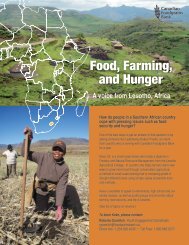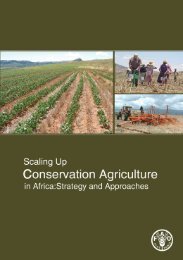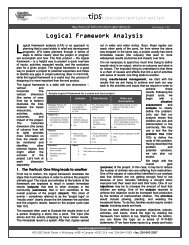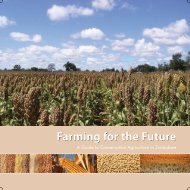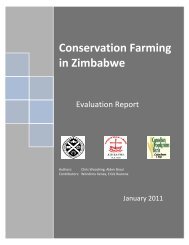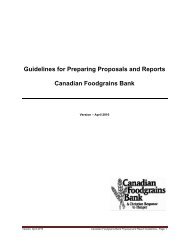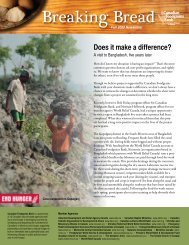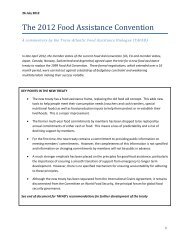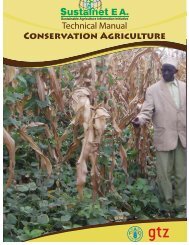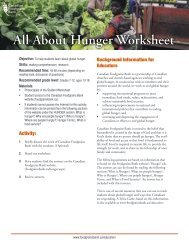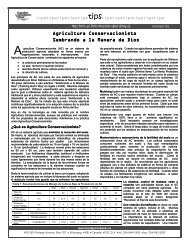Restoring the Soil - Canadian Foodgrains Bank
Restoring the Soil - Canadian Foodgrains Bank
Restoring the Soil - Canadian Foodgrains Bank
Create successful ePaper yourself
Turn your PDF publications into a flip-book with our unique Google optimized e-Paper software.
Choosing The Right GM/CC Cropping System For A Specific Area21How to Achieve <strong>the</strong> Adoption of Green Manure/Cover Crop SystemsA great deal of discussion centers on <strong>the</strong> levels of adoption or abandonment of gm/cc systems around <strong>the</strong> world. In general, evidence indicates that many traditionalgm/cc systems are gradually being abandoned as Green Revolution technology (forexample, using chemical pesticides and genetically modified organisms) has spread, astraditional foods have become unfashionable, as chemical fertilizer has become morewidely available, and as professional extension workers have criticized farmers fordoing things that aren’t recommended in university textbooks. This gradual process ofabandonment has apparently affected such widespread systems as <strong>the</strong> maize/cowpeaand maize/rice bean systems that once existed from Mexico through Nicaragua, and<strong>the</strong> scarlet runner bean/maize system that once stretched from <strong>the</strong> nor<strong>the</strong>rn U.S. toChile.At <strong>the</strong> same time, some o<strong>the</strong>r gm/cc systems have spread widely and quickly right upto <strong>the</strong> present time. One of <strong>the</strong>m is <strong>the</strong> maize/mucuna system that has spread spontaneouslythrough Mexico, Guatemala, Belize and Honduras over <strong>the</strong> last 60 years. So<strong>the</strong> question persists: will gm/cc systems become sustainable, or will <strong>the</strong>y, after muchblood, sweat and tears, become just ano<strong>the</strong>r footnote of history?Quite frankly, a soil fertility crisis is approaching. It will affect <strong>the</strong> whole world, but<strong>the</strong> lowland, drought-prone areas of Africa will be <strong>the</strong> hardest hit. Population growthhas drastically diminished <strong>the</strong> amount of land per family. Approximately 80% of smallholder farmers in Africa have less than two hectares of land. Therefore, most peopletoday have to farm every inch of what little land <strong>the</strong>y have in order to survive; <strong>the</strong>re isnothing left for fallowing. Thus, for <strong>the</strong> first time in history, most of Africa’s lowlandfarmers can no longer fallow <strong>the</strong>ir soils. In addition to this unprecedented problem,farmers’ animals have decreased in numbers (because grazing lands have also beenswallowed up by cultivated farms), chemical fertilizers have increased dramatically inprice because we have used up all <strong>the</strong> world’s cheap fuels, and global warming is alsotaking its toll. Because of this “perfect storm” of factors, harvests in much of lowland,drought-prone Africa are dropping by 10 to 15% a year. Within <strong>the</strong> next five years, wecould witness widespread hunger across much of Africa that will be among <strong>the</strong> worstin recent history, with <strong>the</strong> livelihoods and productive capacity of tens of millions ofsmallholder farmers severely damaged.Most of <strong>the</strong> smallholder farmers of lowland Africa know something is terribly wrong.In hundreds of villages that I recently visited, <strong>the</strong> people are intensely worried. Theirfood supply is diminishing at a rapid rate, and <strong>the</strong>y know of no way to solve <strong>the</strong>problem.For years, a large majority of African farmers really weren’t very interested in gm/ccs.But now, I can honestly say that I have never seen farmers as interested in gm/ccs asare <strong>the</strong> farmers today in most of <strong>the</strong> Sahel and lowland sou<strong>the</strong>rn Africa. I think agenciesworking in <strong>the</strong> Sahel and <strong>the</strong> rest of lowland Africa will find that <strong>the</strong> farmers havemuch more interest in improving <strong>the</strong>ir soils than ever before.



